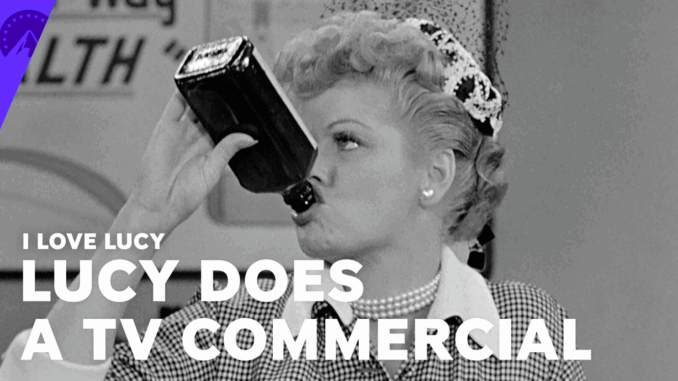
One Commercial, One Woman, One Historic Collapse
On May 5, 1952, Lucille Ball stepped onto a small studio set, held up a fake bottle of syrup, and changed the trajectory of television comedy forever.
The episode was “Lucy Does a TV Commercial.” The product? A fake health tonic called Vitameatavegamin.
What unfolded in the next few minutes wasn’t just funny—it was historic. A slow, drunken unraveling delivered with impeccable timing, facial control, and fearless physical comedy.
And even now, more than 70 years later, audiences still cite that scene as one of the funniest moments ever aired on television.
But what made it so iconic? And why does it still work?
Comedy in the Face of Control
The brilliance of the Vitameatavegamin sketch lies in its structure. The setup is pure 1950s absurdity: Lucy wants to be on television, despite Ricky’s disapproval. She lands a commercial spot, unaware that the tonic she’s advertising contains 23% alcohol.
Each take she films becomes more slurred, more unhinged, more delightful.
But what makes it timeless isn’t the alcohol gag—it’s Lucille Ball’s performance.
She delivers the lines (“Are you un-poopular? Do you pop out at parties?”) with such sincerity that the comedy never feels forced. Her body betrays her before her voice does. Her slow descent into tipsy chaos is surgical.
It’s comedy under control—and then out of control.
The Physical Genius of Lucille Ball
Ball wasn’t just a funny actress. She was an athlete of comedy.
The Vitameatavegamin scene showcases her strength: precise timing, fearless expression, and the ability to make chaos look effortless. Watch her eyes in that scene. They flicker with confusion, defiance, commitment.
She’s not just pretending to be drunk. She’s showing you every internal calculation her character is making—and letting it leak out through the cracks.
The studio audience couldn’t contain themselves.
Neither could America.
A Moment That Defined a Medium

That single episode did more than boost ratings. It proved that television could deliver not just scripted stories, but moments.
It helped cement I Love Lucy as a new kind of show: one that didn’t rely on guest stars or punchlines, but on character-driven, performance-first storytelling.
And it solidified Lucille Ball as the face of American television.
No wonder the Smithsonian keeps that bottle of Vitameatavegamin on display.
It’s not just a prop. It’s a relic.
Final Thoughts: Still Funny, Still Alive
We live in an age of viral videos, TikToks, and 30-second dopamine hits. But somehow, Lucy’s slow, spiraling collapse while trying to say “Vitameatavegamin” still outshines them all.
That’s not nostalgia. That’s greatness.
And that one episode?
It’s not just funny.
It’s immortal.